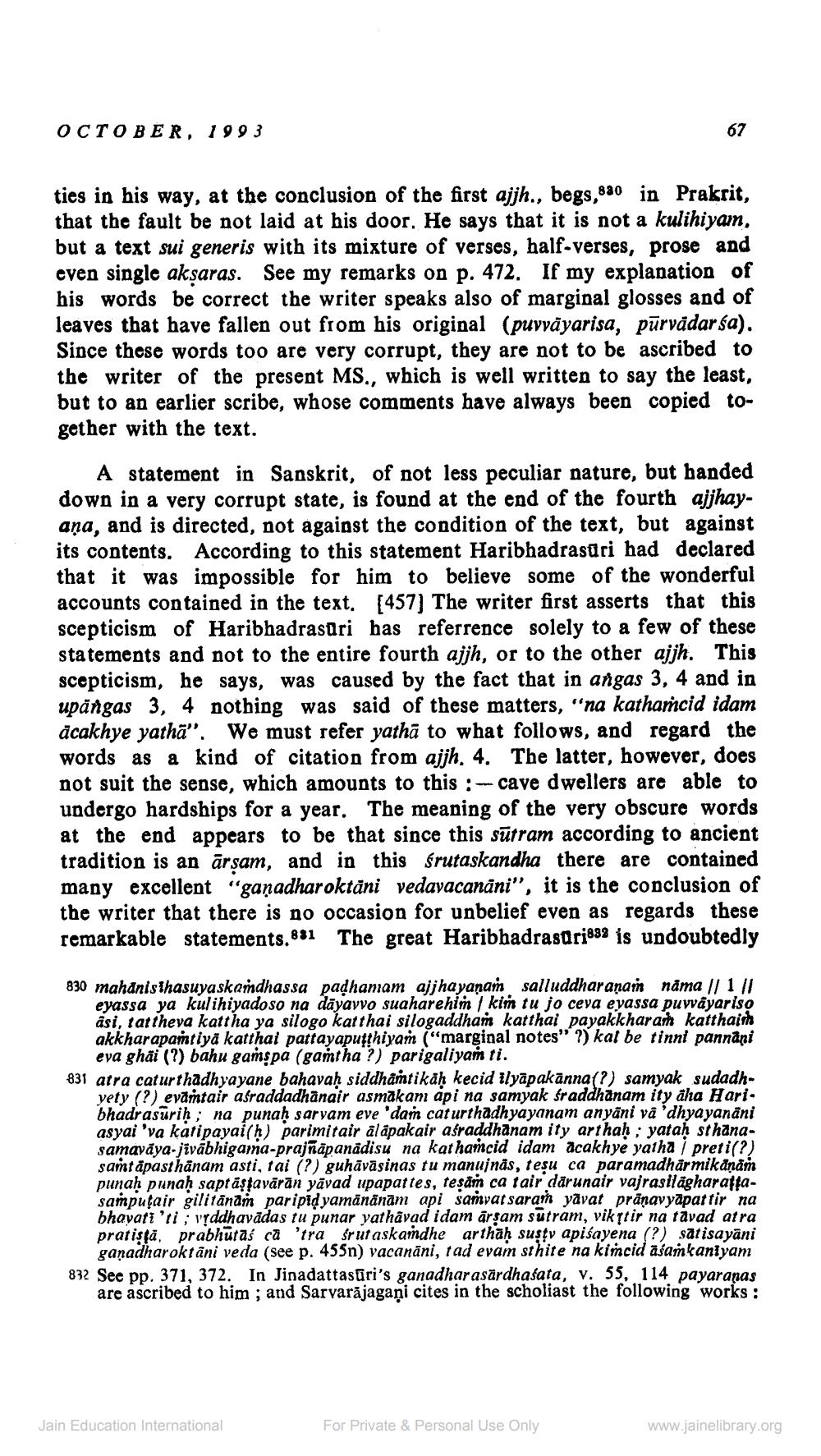________________
OCTOBER, 1993
67
ties in his way, at the conclusion of the first ajjh., begs,880 in Prakrit, that the fault be not laid at his door. He says that it is not a kulihiyam, but a text sui generis with its mixture of verses, half-verses, prose and even single aksaras. See my remarks on p. 472. If my explanation of his words be correct the writer speaks also of marginal glosses and of leaves that have fallen out from his original (puvväyarisa, pūrvādar $a). Since these words too are very corrupt, they are not to be ascribed to the writer of the present MS., which is well written to say the least, but to an earlier scribe, whose comments have always been copied together with the text.
A statement in Sanskrit, of not less peculiar nature, but handed down in a very corrupt state, is found at the end of the fourth ajjhayaņa, and is directed, not against the condition of the text, but against its contents. According to this statement Haribhadrasari had declared that it was impossible for him to believe some of the wonderful accounts contained in the text. [457] The writer first asserts that this scepticism of Haribhadrasari has referrence solely to a few of these statements and not to the entire fourth ajjh, or to the other ajjh. This scepticism, he says, was caused by the fact that in angas 3, 4 and in upängas 3, 4 nothing was said of these matters, "na kathaṁcid idam acakhye yatha". We must refer yathā to what follows, and regard the words as a kind of citation from ajjh. 4. The latter, however, does not suit the sense, which amounts to this : -cave dwellers are able to undergo hardships for a year. The meaning of the very obscure words at the end appears to be that since this sūtram according to ancient tradition is an ārsam, and in this frutaskandha there are contained many excellent "gañadharoktáni vedavacanäni", it is the conclusion of the writer that there is no occasion for unbelief even as regards these remarkable statements.881 The great Haribhadrastri889 is undoubtedly
830 mahanisthasuya skandhassa padhamam ajjhayanam salluddharaṇam nama || 1 ||
eyassa ya kulihiyadoso na dayayvo suaharehim kim tu jo ceva eyassa puvvayariso asi, tattheva kattha ya silogo kat thai silogaddham katthai payakkhara katthaith akkharapamtiya katthai pattayaputthiyam ("marginal notes" ?) kat be tinni pannani
eva ghäi (?) bahu gaṁspa (gantha ?) parigaliyam ti. 831 atra caturthadhyayane bahavaḥ siddhantikaḥ kecid ilyāpakānna(?) samyak sudadh
yety (?) evantair asraddadhanair asmakam api na samyak sraddhanam ity aha Hari. bhadrasurih; na punaḥ sarvam eve 'dam caturthadhyayanam anyāni va 'dhyayanāni asyai 'va katipayai(h) parimitair ālāpak air asraddhanam ity arthah ; yatah sthanasamavāya.jivābhigama-prajñāpanādisu na kat hamcid idam acakhye yarha i preti(?) santapast hänam asti, tai (?) guhāvāsinas tu manujnäs, teșu ca paramadhärmikanañ punaḥ punaḥ saptāştavārān yāvad upapattes, tesam ca tair darunair vajrasilāgharaffasamputair gilitanan paripid yamānānām api samvatsaran yāvat prānavyāpat tir na bhavati 'ti; vyddhavādas tu punar yathavad idam ärşam sūtram, vikytir na tävad atra pratistă. prabhutaś ca 'tra srutaskaidhe arthah sustv apiśayena (?) satisayani
ganadharoktani veda (see p. 455n) vacanāni, tad evam sthite na kimcid aśamkaniyam 832 See pp. 371, 372. In Jinadattasari's ganadharasārdhasata, v. 55, 114 payaranas
are ascribed to him ; and Sarvarājagaņi cites in the scholiast the following works:
Jain Education International
For Private & Personal Use Only
www.jainelibrary.org




